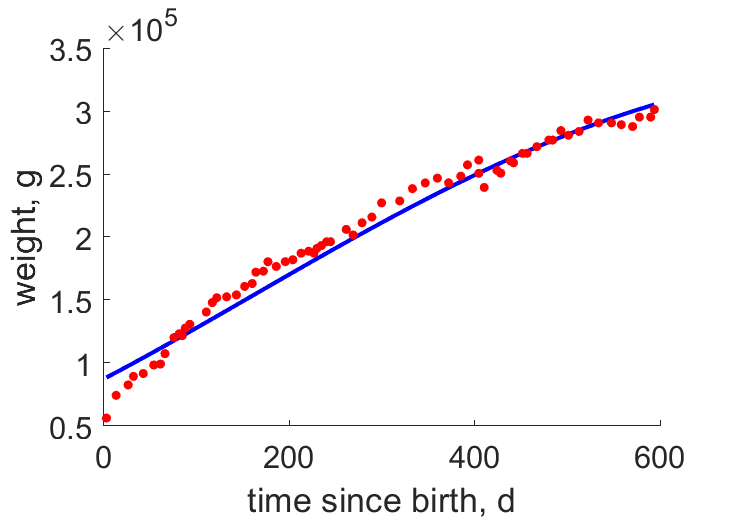Predictions & Data for this entry
| Model: stx | climate: MC, ME | migrate: Mo | phylum: |
| COMPLETE = 2.5 | ecozone: MN, MPN | food: bxM, xiCi | class: |
| MRE = 0.060 | habitat: 0iMp | gender: Dg | order: |
| SMSE = 0.009 | embryo: Tv | reprod: O | family: |
Zero-variate data
| Data | Observed | Predicted | (RE) | Unit | Description | Reference |
|---|---|---|---|---|---|---|
| tg | 450 | 340.7 | (0.2428) | d | gestation time | ADW |
| tx | 396.5 | 377 | (0.0492) | d | time since birth at weaning | KastKlas2003 |
| tp | 1825 | 1841 | (0.008498) | d | time since birth at puberty | ADW |
| tpm | 2555 | 2543 | (0.00459) | d | time since birth at puberty | ADW |
| am | 1.46e+04 | 1.464e+04 | (0.002969) | d | life span | AnAge |
| Wwbm | 5.6e+04 | 9.991e+04 | (0.7842) | g | wet weight at birth for males | KastKlas2003 |
| Wwx | 2.5e+05 | 2.69e+05 | (0.07595) | g | wet weight at weaning | KastKlas2003 |
| Wwi | 8.5e+05 | 1.065e+06 | (0.2532) | g | ultimate wet weight fem. | Wiki |
| Wwim | 2e+06 | 1.796e+06 | (0.1022) | g | ultimate wet weight male | Wiki |
| Ri | 0.00137 | 0.001375 | (0.003402) | #/d | maximum reprod rate | Wiki |
Uni- and bivariate data
| Data | Figure | Independent variable | Dependent variable | (RE) | Reference |
|---|---|---|---|---|---|
| tW_m |  | time since birth | weight | (0.04117) | KastKlas2003 |
Pseudo-data at Tref = 20°C
| Data | Generalised animal | Odobenus rosmarus divergens | Unit | Description |
|---|---|---|---|---|
| v | 0.02 | 0.04089 | cm/d | energy conductance |
| p_M | 18 | 55.28 | J/d.cm^3 | vol-spec som maint |
| k_J | 0.002 | 0.002 | 1/d | maturity maint rate coefficient |
| k | 0.3 | 0.2834 | - | maintenance ratio |
| kap | 0.8 | 0.7829 | - | allocation fraction to soma |
| kap_G | 0.8 | 0.8012 | - | growth efficiency |
| kap_R | 0.95 | 0.95 | - | reproduction efficiency |
Discussion
- Males are assumed to differ from females by {p_Am} and E_Hp only.
- mod_1: males have equal state variables at b, compared to females
Facts
- This species is subdivided into three subspecies:the Atlantic walrus (O. r. rosmarus) which lives in the Atlantic Ocean, the Pacific walrus (O. r. divergens) which lives in the Pacific Ocean, and O. r. laptevi, which lives in the Laptev Sea of the Arctic Ocean. (Ref: Wiki)
- Sexual dimorphism: males larger (Ref: ADW)
Acknowledgment
- The creation of this entry was support by the Norwegian Science Council (NFR 255295)
Bibliography